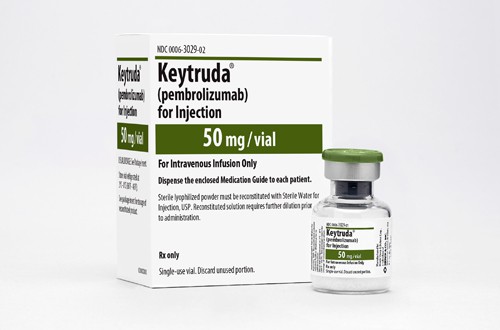
The EMA has approved Merck & Co/MSD’s Keytruda as a first-line treatment for head and neck cancer, a few months after it was cleared by the FDA with a slightly broader label.
The top-selling checkpoint inhibitor has been given the green light by the EMA for previously-untreated metastatic or unresectable recurrent head and neck squamous cell carcinoma (HNSCC) in patients whose tumours express PD-L1, both as a monotherapy and in combination with platinum and 5-fluorouracil (5-FU) chemotherapy.
The FDA approval was a little different, covering monotherapy with Keytruda (pembrolizumab) in PD-L1 expressors, but allowing the combination regimen to be used in ‘all-comers’, i.e. regardless of a patient’s PD-L1 status.
Nevertheless, Keytruda is the first anti-PD-1 drug to be cleared in Europe for this use, giving HNSCC patients a much-needed new treatment option and MSD’s drug another leg up over its rivals in the checkpoint inhibitor category such as Bristol-Myers Squibb’s Opdivo (nivolumab).
Keytruda is also the first PD-1 therapy to improve overall survival in first-line HNSCC, hitting that objective in the phase 3 KEYNOTE-048 study reported last year.
In the trial, Keytruda as a monotherapy and in combination with chemo improved OS by 22% and 23%, respectively, compared to what has been the standard first-line treatment for this cancer for a decade – the EXTREME regimen of Eli Lilly’s Erbitux (cetuximab) with a platinum drug plus 5-FU – in the PD-L1-expressing group.
As a monotherapy Keytruda proved to be non-inferior to EXTREME across all levels of PD-L1 expression, with a better safety profile and a response rate that was lower but much more long-lasting. The combination regimen outperformed EXTREME regardless of PD-L1 expression levels.
After the KEYNOTE-48 results were published in The Lancet earlier this year, Keytruda alone and with chemo was billed as a “new standard of care” for HNSCC that represents “substantial progress for patients.”
BMS says there were more than 705,000 new cases of head and neck cancer diagnosed worldwide in 2018, causing more than 358,000 deaths, so the new indication represents a big new market for Keytruda, already riding high with sales rising 62% to $3.1bn in the third quarter.
In Europe alone, it estimates there were more than 146,000 new cases and some 66,000 deaths from the disease last year.
Keytruda also overtakes Opdivo in HNSCC, which at the moment is only approved as a second-line therapy for this form of cancer after chemotherapy in both the US and Europe.




